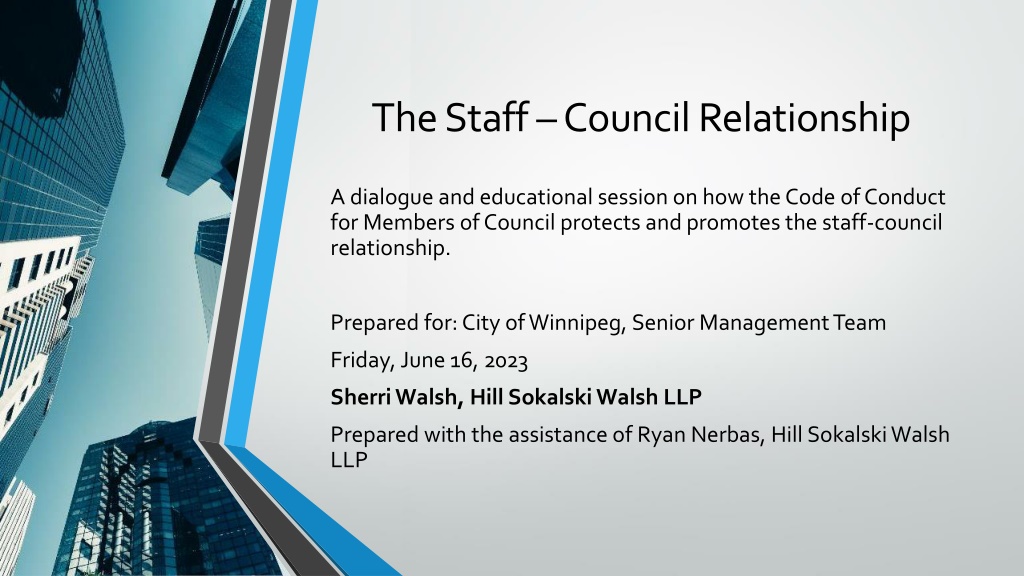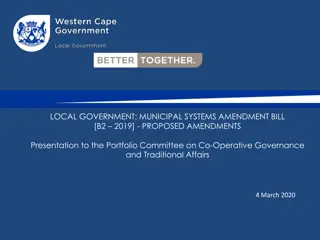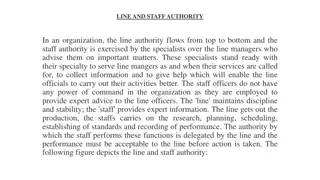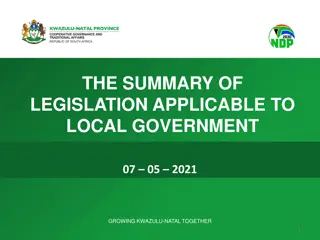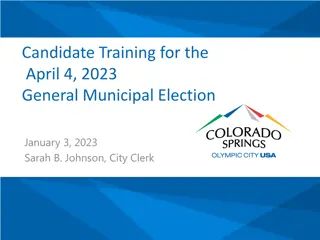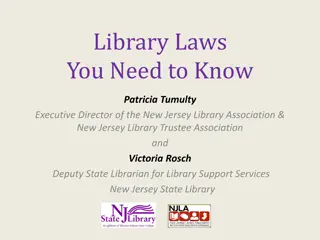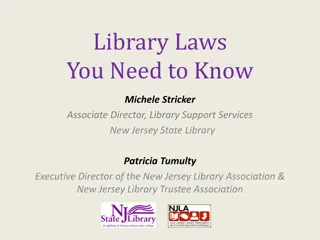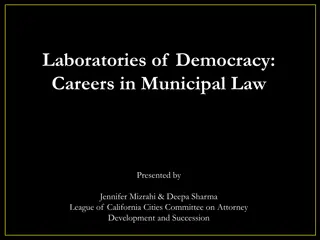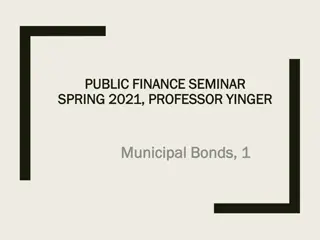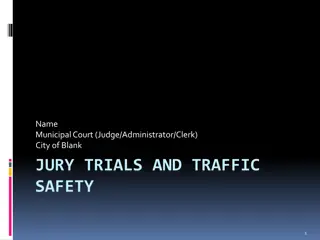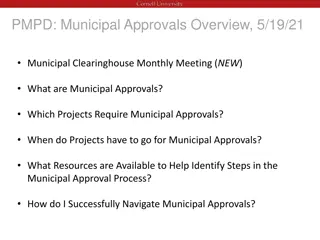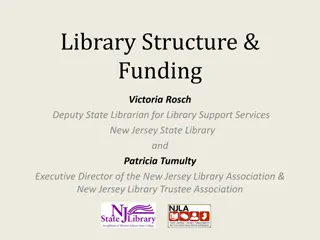Understanding the Staff-Council Relationship in Municipal Governance
The staff-council relationship plays a crucial role in the success of local government. Municipal council members and administration have distinct roles, with council governing and leading based on public issues, while administration provides advice and carries out council decisions efficiently. Both council members and the public service have respective accountabilities to the electorate, with council facing scrutiny every four years. Senior staff members bring specialized expertise and experience to support the council's decisions.
- Municipal Governance
- Staff-Council Relationship
- Accountability
- Local Government
- Professional Expertise
Download Presentation

Please find below an Image/Link to download the presentation.
The content on the website is provided AS IS for your information and personal use only. It may not be sold, licensed, or shared on other websites without obtaining consent from the author. Download presentation by click this link. If you encounter any issues during the download, it is possible that the publisher has removed the file from their server.
E N D
Presentation Transcript
The Staff Council Relationship A dialogue and educational session on how the Code of Conduct for Members of Council protects and promotes the staff-council relationship. Prepared for: City of Winnipeg, Senior Management Team Friday, June 16, 2023 Sherri Walsh, Hill Sokalski Walsh LLP Prepared with the assistance of Ryan Nerbas, Hill Sokalski Walsh LLP
Key Relationship between Council and Staff The relationship between any municipal council and its professional public service is critical to the overall success of local government. Valerie Jepson, Integrity Commissioner for the City of Toronto, Report Regarding the Conduct of Councillor Josh Matlow, June 18, 2019 at p. 9. 2
Distinction between Council and Staff Municipal civil servants work for Council as a whole; they do not work for the mayor, or committee chairs, or any individual councillor. The roles of council members and administration legally and practically are separate. The purpose of council is to govern and lead the community from the perspective of locally elected politicians. It is the job of each council member to reflect and represent public issues and concerns to the rest of council. The role of administration is to provide council with wise advice as to what needs to be done, and then to carry out the wishes of council in an effective, efficient and sensitive manner. George B. Cuff, Council & Administration: Distinction of Roles , 114 Municipal World (October 2004) No. 10, 39-40 at 39. 3
Accountability Respective Roles of Council and the Public Service Municipal councils are elected by popular vote and are accountable to an electorate. This requires members of councils to be in tune with local issues and able to explain and answer for their actions. The mayor and councillors elected by popular vote are expected to have a commitment to good government or efficient service delivery, but no one expects them to know the details of bridge building or social service administration. The legitimacy of councillors flows from the fact that they must face the electorate to explain and defend their past actions. The verdict on whether they do a good job will be delivered every four years by the civic electorate. Fenn, M. & Siegel, D. (2017). The Evolving Role of City Managers and Chief Administrative Officers. IMFG Papers on Municipal Finance and Governance, No. 31. Toronto: University of Toronto, IMGF Institute on Municipal Finance and Governance. 4
Accountability Respective Roles of Council and the Public Service While the public service must be aware of local concerns, it offers a different perspective than council. Senior staff members derive their legitimacy from specialized professional expertise. They have attained their current position by moving up through a merit-based bureaucracy, or through career experience in similar organizations. They receive professional training at the beginning of their careers, as well as on-the-job socialization that immerses them further in their professional ethos. This type of career gives them a high level of expertise and a great deal of experience in their specific field. Fenn, M. & Siegel, D. (2017). The Evolving Role of City Managers and Chief Administrative Officers. IMFG Papers on Municipal Finance and Governance, No. 31. Toronto: University of Toronto, IMGF Institute on Municipal Finance and Governance. 5
Differing Perspectives Mayor and Councillors CAO and Staff Products of the local community Concern for re-election Compromise to get groups on side Short-term horizon Sensitivity to local culture Products of a professional ethos Allegiance to professional principles Rational decision-making Long-term horizon Focus on rational, professional values Fenn, M. & Siegel, D. (2017). The Evolving Role of City Managers and Chief Administrative Officers. IMFG Papers on Municipal Finance and Governance, No. 31. Toronto: University of Toronto, IMGF Institute on Municipal Finance and Governance. 6
Best Policy Resides at the Intersection The tension between political accountability and professional expertise that sometimes results between council and staff is a healthydynamic and one that can lead to good public policy. The best public policy comes about not when one side defeats the other and gets its way, but when a policy resides at the intersection of the two interests. The mayor and councillors have an obligation to ensure that all decisions made by council reflect the prevailing local culture. Ignoring this requirement will cost them their jobs at the next election. Staff members have an obligation to ensure that decisions also take account of rationally determined professional values. The two groups need to find solutions that reflect both the local culture and rational professional values. This will mean that both sides must be willing to accept something less than ideal. Fenn, M. & Siegel, D. (2017). The Evolving Role of City Managers and Chief Administrative Officers. IMFG Papers on Municipal Finance and Governance, No. 31. Toronto: University of Toronto, IMGF Institute on Municipal Finance and Governance. 7
Summary The municipal council as an elected body provides local sensitivity and ensures that policies fit the local political culture. The professional public service provides expertise in policy development and administration. The best policies are found at the intersection of these two interests responsiveness to local interests tempered by rational, administrative elements. Fenn, M. & Siegel, D. (2017). The Evolving Role of City Managers and Chief Administrative Officers. IMFG Papers on Municipal Finance and Governance, No. 31. Toronto: University of Toronto, IMGF Institute on Municipal Finance and Governance. 8
Political Neutrality Members of council must be able to rely on the political neutrality of the public service. It is for this reason that members of council should not treat public servants as either political adversaries or political allies when debating matters of public policy. 9
Roadmap to Improved Relations Recommendations for both Staff and Council to consider 1. Treat each other - council members and staff equally 2. Keep politics and management separate 3. Remember that elected representatives represent the whole community 4. Ensure there are no surprises 5. Don t air dirty laundry in public 6. Make good use of council members time 7. Make good use of staff time 8. Communications with the public 9. Ensure R-E-S-P-E-C-T 10
1. Treat each other - council members and staff equally Experienced municipal staff will remind both staff and councillors that staff members need to avoid favouritism or even the appearance of favouritism. Whatever their differences in experience and abilities, all councillors should be treated equally by staff. Most successful senior municipal managers promote a formal relationship between municipal staff and elected representatives, especially during public meetings or business dealings. It is also essential to treat council as a collective decision-making body, not as a collection of individuals. Everyone recognizes that the head of council is expected to be the leader of council and a first among equals. With that role comes a close working relationship between the mayor and the CAO. Fenn, M. & Siegel, D. (2017). The Evolving Role of City Managers and Chief Administrative Officers. IMFG Papers on Municipal Finance and Governance, No. 31. Toronto: University of Toronto, IMGF Institute on Municipal Finance and Governance. 11
2. Keep politics and management separate Policy decisions are Council s business; management is management s business. To promote good relationships, staff must respect democracy, and councillors must respect professional management. What you call me tells me what you think of me, especially in the eyes of the public. Municipal professionals understandably prefer being called by their title or staff, rather than bureaucrats . Local elected representatives similarly prefer to be called by their title or elected representatives, rather than politicians. Fenn, M. & Siegel, D. (2017). The Evolving Role of City Managers and Chief Administrative Officers. IMFG Papers on Municipal Finance and Governance, No. 31. Toronto: University of Toronto, IMGF Institute on Municipal Finance and Governance. 12
3. Remember that elected representatives represent the whole community As 19th-century parliamentarian Edmund Burke would say, councillors periodically need to remind themselves that they are legislators and representatives, not just community delegates or customer service representatives. They are representatives in a democratic process, not agents or rubber stamps. The job of elected representatives is to make decisions based on the good of the broader community, including people who have not been heard at council or in the media or on social media, as well as those who will come in the future. In some cases, it will fall to municipal staff to gently remind councillors of this broader, fiduciary obligation to represent the unrepresented, including future residents. 13
For councillors, it makes sense to rely on feedback received during the election, and in municipal customer satisfaction surveys, rather than simply accepting the wisdom of currently trending views on social media or from council delegations. Ultimately, councillors must rely on their own judgment and duediligence, and then show leadership on issues. Fenn, M. & Siegel, D. (2017). The Evolving Role of City Managers and Chief Administrative Officers. IMFG Papers on Municipal Finance and Governance, No. 31. Toronto: University of Toronto, IMGF Institute on Municipal Finance and Governance. 14
4. Ensure there are no surprises Staff generally take the view that when councillors look competent and goal-oriented, that reflects well on the whole organization, including staff. In other words: When you look good, we look good and vice versa. That is why councillors are cautioned against making important policy decisions in a vacuum or on the fly, such as during a council meeting in response to a public delegation s request or complaint. It is always a matter of good professional courtesy for councillors to warn staff ahead of time if they are going to raise an issue or criticize staff s actions, to ensure that an informed response can be provided. It will also avoid the risk of embarrassing a councillor publicly, if staff provide information of which the councillor was unaware. Similarly, it is unfair to other councillors for one councillor to announce at a meeting, I ve spoken to staff and they agree with me. Staff members speak for themselves, usually in writing at council or in person at committee or council. 15
The converse is equally true. While staff should leave public debate to councillors, they should not leave them exposed. Staff need to anticipate the challenges that councillors might face, and to provide them with information to frame a cogent public response to predictable questions from citizens or the media, especially when facing the immediacy of social media and the 24-hour news cycle. Finally, it is important to get things right when acting as a legislator, such as making an amendment to a staff recommendation or taking a new direction. If staff members are professionals, they will not argue with a councillor, but they will assist in ensuring that a draft resolution has no obvious flaws or inaccuracies. Staff members need to implement whatever council authorizes. Fenn, M. & Siegel, D. (2017). The Evolving Role of City Managers and Chief Administrative Officers. IMFG Papers on Municipal Finance and Governance, No. 31. Toronto: University of Toronto, IMGF Institute on Municipal Finance and Governance. 16
5. Dont air dirty laundry in public Municipal government operates in a political arena, with all that that implies. As a result, a councillor may quite properly or even simply for political reasons accuse staff of being incorrect, lacking in research or creativity, being insensitive to community concerns, or being too slow to deal with an issue. Staff may not like it, but they have broad shoulders and it is the right of the democratically elected representative to say such things if they are warranted. But there are limits that should not be exceeded. Best practice says it is the duty of the head of council and the CAO to act decisively when these limits are exceeded. A councillor should never accuse a staff member publicly of stupidity, unethical behaviour, or incompetence. 17
If an elected representative feels that way about a member of staff, he or she should take it up with the CAO (or with the head of council, in the case of the CAO), in private. Likewise, if a staff member feels his or her integrity or honesty is being questioned, or if workplace interactions with a councillor are inappropriate or demeaning, he or she should take the matter up with the CAO and take advantage of the protections afforded to all employees, including in serious cases, access to the municipal integrity commissioner. Fenn, M. & Siegel, D. (2017). The Evolving Role of City Managers and Chief Administrative Officers. IMFG Papers on Municipal Finance and Governance, No. 31. Toronto: University of Toronto, IMGF Institute on Municipal Finance and Governance. 18
6. Make good use of council members time Ensure staff presentations and delegations do not consume all of the time allotted for councillors to debate and decide on an issue. 19
7. Make good use of staff time It is important for councils to use staff resources to their best advantage. Every staff report costs taxpayers money, and takes staff time away from some other issue or problem that needs attention. Where possible, councillors should avoid the temptation to defer or to refer back for a staff report, if it really is not necessary (such as to defuse a tense situation caused by an unhappy public delegation). Fenn, M. & Siegel, D. (2017). The Evolving Role of City Managers and Chief Administrative Officers. IMFG Papers on Municipal Finance and Governance, No. 31. Toronto: University of Toronto, IMGF Institute on Municipal Finance and Governance. 20
8. Communications with the public After committee decisions have been made, it is good practice for staff to pass the ball to the standing committee chair, or the champion of the issue on council, to publicly explain, defend, or promote the decision. Since staff members are not generally in a position to comment publicly, other than to provide technical information, elected officials should avoid commenting publicly on staff, leaving any comments to committee meetings where staff can respond directly. Even in that forum, extensive public questioning of senior staff by individual councillors, in a manner that is clearly political in intent or inquisitional in tone, should be avoided. These practices are too frequently in pursuit of the gotcha answer or the headline. 21
The underlying objective is to reinforce in the eyes of the public that elected representatives are in charge. Fenn, M. & Siegel, D. (2017). The Evolving Role of City Managers and Chief Administrative Officers. IMFG Papers on Municipal Finance and Governance, No. 31. Toronto: University of Toronto, IMGF Institute on Municipal Finance and Governance. 22
9. Ensure R-E-S-P-E-C-T To borrow from Aretha Franklin, the first ingredient in any good relationship is a climate of mutual respect. That can be easier said than done, when public criticism of staff by councillors is often popular with journalists or social media. No matter what type of relationship exists between staff and council, the core must be respect for one another: respect for each other s intelligence and professionalism; respect for the public office, no matter how one might feel about the current incumbent of an office; respect for the challenges that each side faces; and respect for the fact that both elected representatives and municipal staff are trying to serve the best interests of their communities and their citizens. Fenn, M. & Siegel, D. (2017). The Evolving Role of City Managers and Chief Administrative Officers. IMFG Papers on Municipal Finance and Governance, No. 31. Toronto: University of Toronto, IMGF Institute on Municipal Finance and Governance. 23
Integrity "Government ethics is not about being "good" or " a person of integrity".... In fact, conduct that is praiseworthy outside of government , such as helping a family member get a job or returning a favor one has been given, is considered wrong in a government context. Government ethics is about acting responsibly and professionally, as a government official or employee, under certain circumstances and following certain rules and procedures. It is about preserving institutional rather than personal integrity. Government ethics decision-making should be just another professional routine. Robert Weschler: Local Government Ethics Programs In a Nutshell, City Ethics Inc., 2013. 24
Public Trust "The proper operation of our city's government requires: That its public officials and employees act as fiduciaries entrusted with and responsible for the property and resources of the community; That they make governmental decisions and policies in the proper channels of the government structure , free of coercive or other improper influence; That they use their position in the best interests of the city rather than for personal interests, whether their own interests or those of their family, friends or business associates; and That they do not, directly or indirectly, in a positive or negative sense, treat anyone preferentially, that is, other than in a manner generally accorded to city residents. Robert Weschler, Model Municipal Code of Ethics, City Ethics Inc., 2006 25
Ethics and Accountability Frameworks Establishing a formal ethics and accountability framework allows for ethical issues and complaints about the conduct of members of Council, to be dealt with in a fair and consistent manner. The Integrity Commissioner forms an integral part of the City of Winnipeg s ethics and accountability framework, which includes: a Code of Conduct which contains a mechanism for accepting, investigating and reporting on complaints made about the ethical conduct of members of Council; and an Integrity Commissioner who performs the dual role of providing advice about compliance with the Code and objective scrutiny of whether an elected official has met the standards set out in the Code. 26
Integrity Commissioner The Integrity Commissioner is independent of Council. The role is intended to encourage and sustain a culture of integrity and accountability for the members of Council of the City of Winnipeg. 27
City of Winnipeg Integrity Commissioners Mandate https://www.winnipeg.ca/council/integritycommissioner/ Advisory provide advice to Members of Council and Council as a whole on questions under the City s Code of Conduct. Investigative investigate complaints and conduct inquiries into whether a Member of Council has contravened the City s Code of Conduct Educational publish annual reports on the work of the office of the Integrity Commissioner, including examples in general terms of advice rendered and complaints received and disposed of. Other oversee the City s Lobbyist Registry 28
Measurements of Success 1. How often the Integrity Commissioner is contacted by members of Council for advice; 2. How well members of Council understand their ethical obligations; 3. How willing members of Council are to engage with the Integrity Commissioner. Despite what the general public may perceive, the following are not measurements of success: number of complaints received; number of complaints investigated; or number of published reports finding a breach of the code. 29
Code of Conduct for Members of Council for the City of Winnipeg https://www.winnipeg.ca/council/integritycommissioner/pdfs/CodeofConduct.pdf Enacted pursuant to Members of Council Code of Conduct By-law No. 19/2018, effective February 22, 2018 Replaces 1994 Code of Conduct This Code was developed and passed in collaboration with all then-sitting Members of Council for the City of Winnipeg 30
The Code- Preamble A. PREAMBLE Members of Council for the City of Winnipeg recognize that they hold office for the benefit of the public and that their conduct must adhere to the highest ethical standards, exceeding the minimum obligations required by law. A written Code of Conduct demonstrates that Members of Council share a common understanding of the ethical obligations which are essential to the fair and effective operation of government. Members of Council first instituted a Code of Conduct in 1994. This Code of Conduct stems from the principles set out in that Code. Although the Preamble cannot support a stand-alone contravention of the Code of Conduct, together with the Key Principles listed below, it provides a helpful framework within which to review the actions of Members of Council. To further assist Members of Council and members of the public in understanding and interpreting the Code of Conduct, the Code of Conduct document shall be made available in a version which includes commentary provided by the Integrity Commissioner. That commentary, which will be updated from time to time by the Integrity Commissioner, does not form part of the Code of Conduct itself. 31
The Code- Key Principles The public interest is best served when Members: perform their duties of office honestly and with integrity, impartiality and transparency, putting the public interest before private and self-interest; conduct themselves in such a way as to promote respect for Council and municipal government; serve their constituents and the City in a conscientious and diligent manner and approach decision making with an open mind; and perform their duties of office and manage their private interests in a manner that promotes public confidence and trust in the political process. 32
The Code- Rules of Conduct Members are bound by 11 Rules of Conduct 1. 2. Conflict of Interest 3. Fundraising 4. Gifts and Benefits 5. Use of Influence 6. Use of Staff, Resources and Property 7. Election-Related Activity 8. Conduct Concerning Staff 9. Respectful Conduct 10. Adherence to Council Policies and Procedures 11. Reprisals and Obstruction Confidential Information 33
Rule 8 Conduct Concerning Staff a. Members must not directly or indirectly, request, induce, encourage, aid, or permit staff to do something which, if done by the Member, would be a breach of this Code of Conduct. b. Members must not compel staff to engage in partisan political activities or subject them to reprisal of any kind for refusing to engage in such activities. c. Members must not use, or attempt to use, their authority for the purpose of intimidating, coercing, or influencing staff with the intent of interfering with such staff s duties. d. Members must not maliciously or falsely impugn or injure the professional or ethical reputation or the prospects or practice of staff and must at all times show respect for staff s professional capacities. 34
Regulation of Conduct Towards Staff Members of Council should not try to circumvent the code by asking or suggesting that staff do something that would be unethical for the Members to do themselves. Members of Council must be respectful of staff s role to provide advice which is based on political neutrality, objectivity and expertise and without undue influence from any individual Member or faction of council. Members of Council are still entitled to express criticism in a respectful manner based on factual matters. It is not appropriate for a Member to attempt to influence staff to circumvent normal processes or overlook deficiencies in a file or application. It is also inappropriate for Members to involve themselves in matters of administration or departmental management which fall within the jurisdiction of the Chief Administrative Officer and staff. 35
Examples Hamilton, Ontario, Councillor Whitehead, November 3, 2021 Member engaged in hostile cross-examination style of questioning while staff member was presenting a report to Council. Cornwall, Ontario, Councillor Towndale, February 24, 2021 Member made social media posts regarding the resignation of the municipality s fire chief. This was a direct criticism of staff made in a forum and in a context where it cannot be interpreted by any third party as anything other than a criticism . Norfolk County, Ontario, Mayor Chopp, April 9, 2019 Mayor made a scene of ripping a staff report in half during an open public meeting where that staff member was in attendance to present that report to Council. Toronto, Ontario, Councillor Ford, October 23, 2012 Then-Councillor made comments about senior staff member on radio show, asked rhetorically how does (staff member) still have a job? 36
Decorum The rationale for requiring decorum in Council and Committee meetings was well stated in the Commission Report of The Honourable Madam Justice Denise E. Bellamy (Toronto Computer Leasing Inquiry/Toronto External Contracts Inquiry, 2005): Ill-mannered behaviour impedes the effectiveness of Council as a decision- making body and diminishes the stature of Council in the eyes of the public. Principled criticism of others positions is to be expected at times, but it should be delivered respectfully and civilly. Angry or abusive language and personal attacks are inappropriate at all times. 37
Conduct in the Chamber- Procedural By-Law no. 50/2007 The Presiding Officer (generally, the Speaker) has jurisdiction to maintain order and decorum in the Chamber and has broad powers to take such actions as circumstances warrant to maintain order and decorum in the Chamber Act of harassment whether personal, sexual, racial or otherwise may lead to the Presiding Officer naming the offending Member. The Member must then immediately cease and desist from any further acts of harassment. Further acts will result in an ejection from the Chamber. 9(17) When a member is addressing the Council the member (a) shall not speak disrespectfully of Her Majesty the Queen or her official representatives; (b) shall not use offensive words in referring to any member of the Council, or to any officer or any employee of the City; (c) shall not indulge in personalities in the course of debate nor reflect on the motives of members who may have voted for a particular motion; (d) shall not use profane, vulgar, offensive, threatening or intimidating language. 38
Conduct in the Chamber under the Code The Code provides the Integrity Commissioner with the jurisdiction to investigate complaints regarding conduct that occurs in the Chamber. It is not the Integrity Commissioner s role to stifle debate or legitimate criticism in the Chamber, but Members must not cross the line. 39
Rule 9 Respectful Conduct All Members have a duty to treat members of the public, one another, and staff with respect and without abuse, harassment, or intimidation. a. Harassment includes: i. any behaviour, whether a single incident or a course of conduct, that a reasonable person should have known would be unwelcome, and that is inappropriate, demeaning, humiliating, embarrassing, or otherwise offensive, including but not limited to: a. verbal or written insults, abuse or threats; b. racial or ethnic slurs, including racially derogatory nicknames; c. leering or other offensive gestures; d. bullying; or e. patronizing or condescending behaviour; and ii. objectionable and unwelcome sexual solicitations or advances. b. While Members may passionately debate issues and promote ideas, they must maintain proper decorum during meetings of: Council, Committees of Council, and boards, agencies or commissions on which they serve as part of their duties of office. 40
Harassment Key consideration: whether the conduct is unwelcome or unwanted . Objective standard: is it reasonable to conclude that a reasonable person knew or ought to have known that the conduct was unwelcome or unwanted in the circumstances? What might constitute harassment: Rude, degrading or offensive remarks Intimidating gestures Discrediting a person by spreading rumours or gossip Ridiculing, humiliating or calling into question a person s integrity Unwanted sexual advances What might not constitute harassment: Passionate debate in the Chamber unkind or insensitive comments or actions that do not rise to the level of harassment 41
Examples Sarnia, Ontario, Councillors Burrell and Dennis, July 20, 2022 Members behaviour towards a trainer during a diversity/equity training seminar was hostile to the point of her feeling unsafe , caused her significantharm . Edmonton, Alberta, Councillor Janz, July 4, 2022 Member retweeted a post that contained a comment referring to police officers as pigs ReTweeting has the same effect as a republication of the original Tweet. It is reasonable to conclude that when someone reTweets without commentary, they are implicitly expressing their agreement with the content of the Tweet. The reTweet also results in broader dissemination of the content of the Tweet. Amaranth, Ontario, Mayor Currie, April 26, 2022 Mayor regularly raises his voice, talks over others, yells during meetings, engages in name-calling Storming out of a meeting in a fit of anger is disrespectful, lacks decorum and does not reflect the conduct expected of members of municipal councils Calgary, Alberta, Councillor Woolley, April 9, 2021 Member called fellow Member an ignorantmoron in a tweet. 42
What to Expect in the Event of a Complaint Complaint Received Successful resolution A. Informal Informal discussion Unsuccessful (may file formal complaint) No jurisdiction Out of time Dismissal letter (anonymized) No investigation Frivolous No useful purpose Matter already pending B. Formal Triage Council deliberates on sanctions Breach Report (to council) Investigation No Breach Report (only to the parties) 43
Complaint Procedures Appendix B Part A- Informal Complaints: integrity Commissioner may assist in informal discussion to settle or resolve the matter encouraged as first means of remedying behaviour integrity Commissioner may act as mediator participation in informal process does not preclude undertaking a formal investigation of the same matter not a prerequisite to pursuing formal complaint 44
Complaint Procedures Appendix B Part B- Formal Complaints: anyindividual may file formal complaint Details of complaint disclosed to respondent member, except name of complainant only disclosed where fairness requires it Council may direct investigation by resolution Must generally be made within 60 days after date of conduct, or 60 days after date complainant became aware of conduct May accept complaint filed after expiry of time limit if: delay incurred in good faith; it is in the public interest to conduct an investigation; and no substantial prejudice will result to any person because of the delay 45
Complaint Procedures Appendix B Part B- Formal Complaints Continued S. 7 - May refuse to investigate where: outside jurisdiction; complaint is frivolous, vexatious, not made in good faith; no/insufficient grounds, or unlikely compliant will succeed; or investigation will serve no useful purpose S. 11 - Where the Integrity Commissioner has declined to conduct an investigation, will provide the Respondent with both an anonymized copy of the complaint and the Integrity Commissioner's response to the Complainant. Investigation: both parties provided with details of complaint, submissions, other relevant supporting material may seek information from witnesses 46
Complaint Procedures Appendix B Part B- Formal Complaints Continued Reporting: if no contravention found - no public reporting - report is only provided to the complainant and respondent member; it may be discussed on an anonymous basis in the Annual Report for education purposes if contravention found, Integrity Commissioner shall report publicly to Council including findings, opinion as to how member contravened code, any recommended sanctions or corrective action council shall consider and act on report forthwith. if contravention is found, identity of respondent member shall not be treated as confidential. 47
Sanctions Available sanctions for violations of the Code: Reprimand; Public apology; Return gift or benefit/reimburse donor for the value; Remove member from a committee; and Request Mayor to remove the member from their position as Chair of a committee 48
Questions? 49
